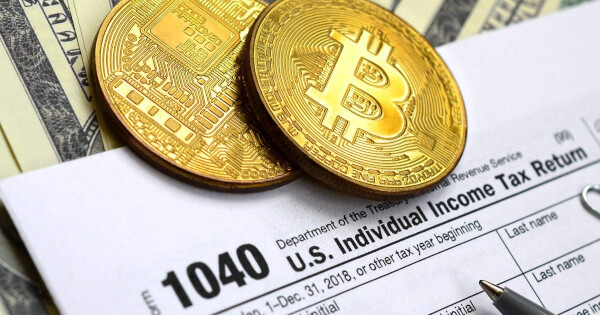A preview of the new Form 1099-DA, a tax form that will be used by cryptocurrency brokers to record transactions involving digital assets, has been made available by the Internal Revenue Service (IRS) of the United States of America. As part of the continuous efforts of the Internal Revenue Service (IRS) to enhance compliance and guarantee that taxpayers appropriately report their income from digital assets, this form has been developed.
By the beginning of the year 2025, it is anticipated that Form 1099-DA will be in use. Brokers will be responsible for preparing this form for each client who sells or trades digital assets. According to the form, brokers will be required to disclose certain information, which may include token codes, wallet addresses, and places where blockchain transactions are taking place. It will be possible for the Internal Revenue Service to identify taxpayers who have transactions that may be difficult to detect via standard ways of information reporting if this level of reporting is implemented.
It is clear that the Internal Revenue Service is committed to resolving the tax consequences of transactions involving digital assets, as seen by the issuance of Form 1099-DA. According to the Internal Revenue Service (IRS), the purpose of mandating that brokers record these transactions is to guarantee that taxpayers correctly report their income and pay the required taxes on their activities involving digital assets.
The rising significance of cryptocurrencies, nonfungible tokens (NFTs), and stablecoins in the financial landscape is reflected in the decision made by the Internal Revenue Service (IRS) to list these digital assets as reportable assets on Form 1099-DA. Having a comprehensive grasp of the digital asset transactions that taxpayers engage in is very necessary for the authorities in charge of taxation, given the continued growth in popularity and utilisation of cryptocurrencies.
Among the crucial data elements that are captured by the draft form are the date of acquisition, the date of sale, the proceeds, and the cost basis of the crypto assets that were sold. For taxpayers to correctly submit their cryptocurrency tax filings, it is vital for them to have these information. Furthermore, the form has a checkbox labelled “unhosted wallet provider,” which serves as an indication that the Internal Revenue Service intends to include unhosted wallets within the definition of a broker. When generating unhosted wallets or engaging with platforms using unhosted wallets, users may be required to give know-your-customer (KYC) information as a result of this shift.
Despite the fact that the draft form offers helpful insights into the reporting requirements, it is essential to keep in mind that it may be subject to modifications as a result of the input that would be received during the comment period. Through its website, the Internal Revenue Service (IRS) welcomes members of the public to provide feedback on draft or final versions of forms, instructions, or publications.
As a conclusion, the issuance of Form 1099-DA by the Internal Revenue Service represents an important milestone in the process of regulating and reporting revenue from transactions involving digital assets. Through the requirement that brokers record these transactions, the Internal Revenue Service (IRS) hopes to promote compliance and guarantee that taxpayers appropriately report the income they get from digital assets. In order to prevent possible fines or audits, it is essential for taxpayers to be knowledgeable about their reporting responsibilities for digital assets, since the landscape of digital assets continues to undergo continuous change.
Image source: Shutterstock
. . .
Tags
Credit: Source link






















 Bitcoin
Bitcoin  Ethereum
Ethereum  XRP
XRP  Tether
Tether  Solana
Solana  USDC
USDC  Dogecoin
Dogecoin  Cardano
Cardano  Lido Staked Ether
Lido Staked Ether  TRON
TRON  Wrapped Bitcoin
Wrapped Bitcoin  Chainlink
Chainlink  Wrapped stETH
Wrapped stETH  Avalanche
Avalanche  Sui
Sui  Stellar
Stellar  Litecoin
Litecoin  Toncoin
Toncoin  Shiba Inu
Shiba Inu  LEO Token
LEO Token  Hedera
Hedera  USDS
USDS  Hyperliquid
Hyperliquid  Polkadot
Polkadot  WETH
WETH  MANTRA
MANTRA  Bitcoin Cash
Bitcoin Cash  Bitget Token
Bitget Token  Ethena USDe
Ethena USDe  Wrapped eETH
Wrapped eETH  Uniswap
Uniswap  Monero
Monero  NEAR Protocol
NEAR Protocol  WhiteBIT Coin
WhiteBIT Coin  Pepe
Pepe  Aave
Aave  Ondo
Ondo  Bittensor
Bittensor  Aptos
Aptos  Dai
Dai  Internet Computer
Internet Computer  Official Trump
Official Trump  Mantle
Mantle  Ethereum Classic
Ethereum Classic  Tokenize Xchange
Tokenize Xchange  OKB
OKB  Gate
Gate  sUSDS
sUSDS  Sonic (prev. FTM)
Sonic (prev. FTM) 
